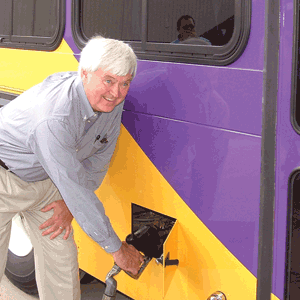U.S. fleets continue to adopt biodiesel blends

July 1, 2004
The number of U.S. fleets using biodiesel-blended fuel continues to rise. Since the May/June issue of Biodiesel Magazine was published, a number of government- and university-operated fleets have transitioned to biodiesel blends. Here's a few that made headlines.
McDonough County fleets in Illinois began using a B2 blend in early June. Macomb city and school district vehicles, as well as Western Illinois University Go West Buses and the county's highway department, refuel with a soy-based blend. Carla Mudd of the McDonough County Farm Bureau said the fleets' biodiesel supply comes from West Central FS Inc.
The city of East Lansing, Mich., has been awarded a biodiesel infrastructure grant from the State Energy Office, allowing the city to enhance its private fueling facility with a biodiesel tank and pump. The $24,000 grant will go toward one of two 25,000-gallon underground storage tanks. According to Dave Smith, an environmental specialist with the East Lansing Public Works Department, terms of the grant specify that the new pump must distribute biodiesel for three years, beginning in April 2005. Smith told Biodiesel Magazine that an estimated 125,000 gallons of biodiesel could be consumed in that time frame.
Kansas University (KU) has joined the growing number of academic institutions using biodiesel in shuttle buses. KU will use a soy-based B20 blend. The Student Senate Transportation Board, which runs "KU on Wheels," is negotiating with Capital City Oil in Topeka, Kan., for a reduced price.
Durango, Colo., received its first load of soy-based biodiesel in June. Approximately 60 city vehicles are using a B20 blend. Blue Sun Biodiesel of Fort Collins, Colo., supplied the fuel. The city uses an average of 10,000 gallons of diesel fuel per month, according to Fleet Manager Roy Peterson.
McDonough County fleets in Illinois began using a B2 blend in early June. Macomb city and school district vehicles, as well as Western Illinois University Go West Buses and the county's highway department, refuel with a soy-based blend. Carla Mudd of the McDonough County Farm Bureau said the fleets' biodiesel supply comes from West Central FS Inc.
The city of East Lansing, Mich., has been awarded a biodiesel infrastructure grant from the State Energy Office, allowing the city to enhance its private fueling facility with a biodiesel tank and pump. The $24,000 grant will go toward one of two 25,000-gallon underground storage tanks. According to Dave Smith, an environmental specialist with the East Lansing Public Works Department, terms of the grant specify that the new pump must distribute biodiesel for three years, beginning in April 2005. Smith told Biodiesel Magazine that an estimated 125,000 gallons of biodiesel could be consumed in that time frame.
Kansas University (KU) has joined the growing number of academic institutions using biodiesel in shuttle buses. KU will use a soy-based B20 blend. The Student Senate Transportation Board, which runs "KU on Wheels," is negotiating with Capital City Oil in Topeka, Kan., for a reduced price.
Durango, Colo., received its first load of soy-based biodiesel in June. Approximately 60 city vehicles are using a B20 blend. Blue Sun Biodiesel of Fort Collins, Colo., supplied the fuel. The city uses an average of 10,000 gallons of diesel fuel per month, according to Fleet Manager Roy Peterson.
Advertisement
Advertisement
Upcoming Events





